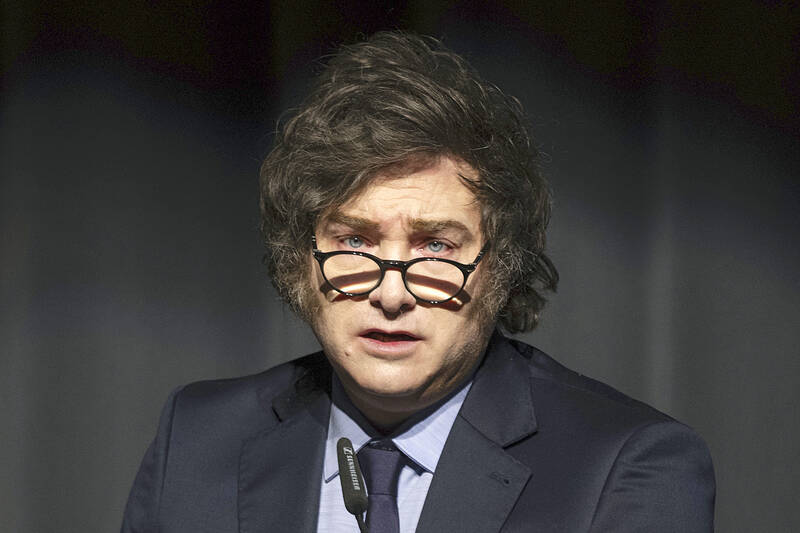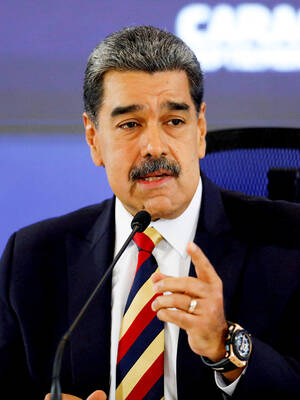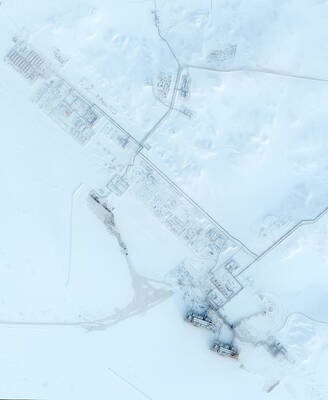Argentina’s president has ordered the country’s withdrawal from the WHO due to “profound differences” with the UN agency, a presidential spokesperson said on Wednesday.
Argentine President Javier Milei’s decision echoes that of his ally, US President Donald Trump, who began the process of pulling the US out of the WHO with an executive order on his first day back in office on Jan. 21.
The loss of another member country would further fracture cooperation in global health, although Argentina was expected to provide only about US$8 million to the WHO for the agency’s estimated US$6.9 billion budget for last year and this year.

Photo: AP
Argentina’s decision is based on “profound differences in health management, especially during the [COVID-19] pandemic,” spokesman Manuel Adorni told a news conference in Buenos Aires.
He said WHO guidelines at the time led to the largest shutdown “in the history of mankind.”
Argentina would not allow an international organization to intervene in its sovereignty “and much less in our health,” he added.
The WHO has no authority to compel countries to take specific health actions, and the organization’s guidelines and recommendations, including in health crises like the COVID-19 pandemic, are often disregarded.
The WHO said it was looking into Argentina’s announcement.
Adorni did not say when Milei’s decision would be implemented. He also said that the WHO lacks independence because of the political influence of some countries, without naming any.
The WHO is the only organization mandated to coordinate global responses to acute health crises, particularly outbreaks of new diseases and persistent threats including Ebola, AIDS and mpox.
Milei was a sharp critic of the lockdown imposed by former Argentine president Alberto Fernandez during the COVID-19 pandemic, asserting that it hurt the economy and that the government used it as a mechanism of “repression.”
“LONG LIVE FREEDOM,” Milei wrote on X on Wednesday criticizing the UN agency.
Argentina does not receive WHO funding for health management, and the president’s decision does not affect the quality of health services, Adorni said.
“On the contrary, it gives greater flexibility to implement policies adopted to the context of interests that Argentina requires,” he added.
Last year, Milei’s government refused to sign an agreement to manage pandemics within the WHO framework, on the grounds that doing so could affect national sovereignty.
The announcement on the WHO comes ahead of Milei’s trip to the US later this month, which coincides with the Conservative Political Action Conference summit of right-wing leaders in Washington.
The spokesperson has not confirmed that Milei would attend or that he might meet Trump.

VENEZUELAN ACTION: Marco Rubio said that previous US interdiction efforts have not stemmed the flow of illicit drugs into the US and that ‘blowing them up’ would US President Donald Trump on Wednesday justified a lethal military strike that his administration said was carried out a day earlier against a Venezuelan gang as a necessary effort by the US to send a message to Latin American cartels. Asked why the military did not instead interdict the vessel and capture those on board, Trump said that the operation would cause drug smugglers to think twice about trying to move drugs into the US. “There was massive amounts of drugs coming into our country to kill a lot of people and everybody fully understands that,” Trump said while hosting Polish President

Japan yesterday heralded the coming-of-age of Japanese Prince Hisahito with an elaborate ceremony at the Imperial Palace, where a succession crisis is brewing. The nephew of Japanese Emperor Naruhito, Hisahito received a black silk-and-lacquer crown at the ceremony, which marks the beginning of his royal adult life. “Thank you very much for bestowing the crown today at the coming-of-age ceremony,” Hisahito said. “I will fulfill my duties, being aware of my responsibilities as an adult member of the imperial family.” Although the emperor has a daughter — Princess Aiko — the 23-year-old has been sidelined by the royal family’s male-only

A French couple kept Louise, a playful black panther, in an apartment in northern France, triggering panic when she was spotted roaming nearby rooftops. The pair were were handed suspended jail sentences on Thursday for illegally keeping a wild animal, despite protesting that they saw Louise as their baby. The ruling follows a September 2019 incident when the months-old feline was seen roaming a rooftop in Armentieres after slipping out of the couple’s window. Authorities captured the panther by sedating her with anesthetic darts after she entered a home. No injuries were reported during the animal’s time on the loose. The court in the

Another tanker carrying liquefied natural gas from Russia’s sanctioned Arctic LNG (liquefied natural gas) 2 project has docked in a Chinese port, ship-tracking data showed, days after Russian President Vladimir Putin met Chinese President Xi Jinping (習近平) in Beijing. The London Stock Exchange Group (LSEG) tracking data indicated the Russian Voskhod LNG tanker was anchored at an LNG terminal in the port of Tieshan in Guangxi, China. The Russian flagged tanker, with a cargo of 150,000 cubic meters of LNG, was loaded up at the Arctic LNG 2 facility in Gydan in northern Siberia on July 19, LSEG data showed.